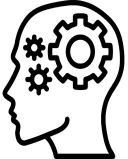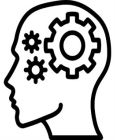Nootropics
How to Use Nootropics for Social Interactions
Boost your confidence, reduce your anxiety, and improve your verbal fluency.
Posted December 11, 2019 Reviewed by Hara Estroff Marano

Caveat: Nootropics are not supposed to be the only thing you use to boost your performance and well-being in social interactions. I suggest you get sleep, exercise, nutrition, and mindfulness before experimenting.
A couple of weeks ago I had a pizza, which I rarely do. A couple of hours after that meal I was on a walk in nature listening to an audiobook, as I often am. I met a couple walking their dog, nothing out of the ordinary. In the part of Sweden where I stayed, people tend to say Hi to each other, so I said Hi, and so did the couple.
Contrary to what I had experienced every time for the past couple of weeks of the summer when saying Hi to people walking by, this time I became really anxious to not seem weird. I had this feeling flowing through my mind that impaired my performance. Instead of getting a 10-second mood boost from smiling when saying Hi, I had a 5-second low-level panic attack prior to the verbal output. I didn’t know these people and don’t care what they think about me if I consciously think about it.
I used to be like this all the time. I believe poor sleep, poor nutrition, relatively poor exercise, and no mindfulness were the big inhibitors of feeling well in social interactions with people I didn’t know during my childhood.
I’m not saying traumatic experiences or the actual sequence of actions that the interaction consists of don’t matter. I’m saying that the experience is biochemically dependent. If you just had a pizza, or another meal that your psyche doesn’t respond well to, you may overthink the word Hi. If you’re in ketosis, you may want to get to know these people you’ve never met before.
Which nootropics to use for social interactions
Note: I use selfhacked.com and examine.com to get a quick overview of a compound and find studies on it.
1. Uridine Monophosphate
Science: UMP, as this nootropic is called, may be able to reduce symptoms of depression. It can probably also enhance memory and learning.
“Uridine promotes the birth of new neurons and the generation of new synapses, especially in combination with brain nutrients like choline and DHA. Human studies have yet to confirm these findings, but animal studies are very promising.” -Selfhacked
My use: In my opinion, the scientifically proven benefits of UMP with use over time are not the interesting ones. Instead, I use it as a nootropic for social interactions where I want to perform cognitively and in my communication. I don’t use this on a schedule, I use it when the occasion calls for it.
UMP amps up my verbal fluency to superhuman levels. It is still beyond me how well this works. I take 100 mg if I want to make sure not to stumble on words, way below the 1000–2000 mg per day dosages that were used in clinical trials. Using UMP for verbal fluency makes me able to speak several sentences in a row without taking a breath or stop to remember what to say. Having great verbal fluency, in turn, boosts my confidence in social interactions.
UMP potently removes brain fog in my experience.
I also sometimes use UMP for motivation, it starts working for me at 200 mg for this, which is the max I ever use because I don’t get better results with more.
My assessment is that uridine monophosphate has no risk for addiction and that there’s only a low risk for side-effects.
2. Ashwagandha
Science: Ashwagandha quite reliably reduces anxiety and stress. The herb induces a state of calm, probably through lowering cortisol levels.
“300 mg of an ashwagandha extract (“full spectrum”) for 60 days in persons with chronic mental stress was able to improve all tested parameters and reduced serum cortisol by 27.9%.” [1]
My assessment is that Ashwagandha has no risk for addiction and that there’s only a low risk for side effects.
My use: I use .75 ml Ashwagandha from a tincture every day before I go to bed. It’s part of my daily nootropic stack. I find it gives me a slight boost in cognition, which I attribute to lower stress. I experience no side effects from Ashwagandha. I don’t use it specifically for social interactions, but I think I get a positive effect on my social interactions from Ashwagandha through improved sleep. I’ve tried using it for social interactions specifically and it does reduce my social anxiety slightly, though it is hard to tell because it is almost at zero pretty much all the time.
3. L-Theanine
Science: L-theanine can prevent spikes in blood pressure [2] and the magnitude of stress responses [3]. There’s a high level of evidence for L-theanine improving relaxation [4], and some evidence for it reducing anxiety [5] as well as improving attention [6] and sleep quality [7].
My assessment is that L-theanine has no risk for addiction and that there’s only a low risk for side effects.
My use: I use 50–400 mg every evening to improve my sleep. I experience no side effects from L-theanine. I don’t use it specifically for social interactions, but I think I get a positive effect on my social interactions from L-theanine through improved sleep. I know it can help reduce social anxiety for me if I’m in a stressed state of mind.
4. Curcumin with Piperine
Science: The main nootropic benefits of curcumin and piperine will be experienced after several weeks of use. Then, it can reduce inflammation, anxiety, and depression. It has a lot of other benefits for mental and bodily health, such as cancer and pain prevention.
Piperine increases curcumin blood absorption by 2,000%. [8]
My use: I use 300 mg curcumin with 3 mg piperine every morning to improve my mood, anxiety, and level of inflammation over the long term. I experience no side effects from curcumin or piperine. I don’t use the combination specifically for social interactions, but I think I get a positive effect on my social interactions over the long term from the various subtle improvements in mental and bodily health markers.
My judgment is that curcumin with piperine has no risk for addiction and that there’s only a low risk for any side effects.
Note: There are many other nootropics that can help you with performance and well-being in social contexts through reduced anxiety and increased cognitive proficiency. I’ve chosen the ones with a very low-risk profile that can still have a significant positive impact on your social interactions.
That’s how I use nootropics for improving well-being and performance while interacting with people.
I hope this can help you help yourself and others.
This post was originally published at nootralize.com. It is not a substitute for professional medical advice, diagnosis or treatment.
References
[1] Chandrasekhar K et al. (2012). A prospective, randomized double-blind, placebo-controlled study of safety and efficacy of a high-concentration full-spectrum extract of ashwagandha root in reducing stress and anxiety in adults. Indian journal of psychological medicine.
[2] Ai Yoto et al. (2012). Effects of L-theanine or caffeine intake on changes in blood pressure under physical and psychological stresses. Journal of Physiological Anthropology.
[3] Kimura K et al. (2007). L-Theanine reduces psychological and physiological stress responses. Biological Psychology.
[4] Song CH et al. (2003). Effects of Theanine on the Release of Brain Alpha Wave in Adult Males. Korean J Nutr.
[5] Ritsner MS et al. (2011). L-theanine relieves positive, activation, and anxiety symptoms in patients with schizophrenia and schizoaffective disorder: an 8-week, randomized, double-blind, placebo-controlled, 2-center study. The Journal of clinical psychiatry.
[6] Akiko Higashiyama et al. (2011). Effects of l-theanine on attention and reaction time response. Journal of Functional Foods.
[7] Lyon MR et al. (2011). The effects of L-theanine (Suntheanine®) on objective sleep quality in boys with attention deficit hyperactivity disorder (ADHD): a randomized, double-blind, placebo-controlled clinical trial. Alternative medicine review.
[8] Shoba G et al. (1998). Influence of piperine on the pharmacokinetics of curcumin in animals and human volunteers. Planta medica.




